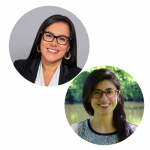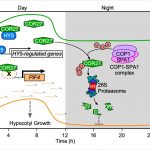2020 ASPB Conviron Scholars Program Highlights

The ASPB Conviron Scholars program delivers an experience intended to serve as a foundation for a career in plant science.
In spite of the pandemic outbreak this year, this program continued to strive and moved forward. Why? Because the ASPB Conviron Scholars program is a virtual learning environment and can proceed even during a lockdown.
The ASPB Conviron Scholars Program is a hands-on learning program that includes 4 major themes that help and develop skills for success:
1) Career Planning
2) Writing and Communication
3) Leadership
4) Professional Presentations
For each of these themes, the scholars attend career seminars and workshops, participate in round-table discussions, network with plant scientists in various fields, and complete scholarly assignments within a private network. The assignments help the scholars to develop transferable and soft skills including writing, designing, presenting, and communicating and to discuss creative ideas in the motivational environment.
For the 2020 program, a total of 16 students were chosen to participate in the program from around the world. We highlighted 5 of them to talk about their experiences.
Introduction to the program
Modesta Abugu, a second year MS student at the University of Florida at Gainesville, US majoring in Horticultural Sciences, researches for the production of high-quality modern commercial tomato varieties using the marker assisted backcross (MABC) method.
For her future career, she is interested in industry and was mentored by Dr. Ajit Nott, a Research Scientist, from Corteva Agriscience, Johnston, IA.
“He gave me lots of advice on how to go about applying for a Ph.D. position. He reviewed my CV and connected me to other PhD students at Corteva Agricscience. He was always willing to talk to me every time I wrote him and he made sure to understand the circumstances and concerns I have, while searching for a Ph.D. position.”
As part of the program, she interviewed Assistant Professor Patricio Munoz at University of Florida in Blueberry Breeding and Genomics. Through this interview, she learned that as a scientist, one needs to train themselves for other skills which you will not get trained on during your Ph.D. They include managerial skills, team building skills, communication skills and financial planning/ budgeting skills.
With teamwork, Modesta and her fellow colleagues (Sessen Daniel, Godwin James, and Aya Bridgeland) in the Conviron Scholar Program conducted an outreach event where they organized a webinar titled, “Future of Our Food Systems: Insights into GMOs” in collaboration with the Sciences in Every Florida School educational outreach program. There were about a hundred students from 3 different high schools in Florida, who participated to this webinar. They used the materials that they created from their introductory group project on GMOs for this outreach event.
“The initiative gave us key insights on students’ acquaintance, opinions and concerns, enabling us to broaden our GMO-science communication perspectives. We were amazed by the positive feedbacks received both during and after the webinar, a sign that young students want to get involved in the public debate and act as agents of change in their communities by spreading reliable information.”
Sessen Daniel Iohannes is a Master’s student at a joint degree program between University of Pisa and Sant’Anna at Pisa, Italy with a major of Molecular Biotechnology. She studies the genetic diversity, genomic features, and agronomic potentials of orphan cereal crops.
She was mentored by Thelma Madzima, an Assistant Professor, at the University of Washington Bothel, WA. Her mentor gave key insights on pursuing a career in academia and advocating for underrepresented groups in STEM. They also discussed on applying for Ph.D. graduate schools in the US.
She says, “Although I still have several months to conclude my master’s program, she has motivated me to start reaching out to potential PIs and she has given me valuable information on scholarships and funding opportunities to pursue a PhD in the US.”
She carried out her informational interview with Michele Morgante, a plant geneticist, full professor at University of Udine in Italy, Scientific Director of the Institute of Applied Genomics (IGA), and former president of the Italian Society of Plant Genetics (SIGA). She wrote a blog article ‘From “Orphan Crops” to “Crops For The Future”’ for the International Day for Biological Diversity, which features her science communication video, an assignment for the Conviron Scholars Program.
Sessen shared her highlight experience in the Conviron Scholars Program as shown in the video below. She says, “This opportunity has definitely broadened my academic and career perspectives in plant sciences. This allowed me to acquire new skills, key skills, science communication and writing, and leadership. Most importantly, this program allowed me to establish strong networks with peers, fellow Conviron scholars, and extraordinary mentors.”
“I really encourage students and early career researchers to cherish this amazing opportunity and to join ASPB, which is really doing an amazing job by bringing the plant science community together and contributing to its advancement.”
Xiang Li is a third year Ph.D. candidate in the Plant Biology graduate program at the University of Massachusetts Amherst, US. His project focuses on understanding the genetic and morphological basis of seed shattering in weedy rice with different evolutionary origins.
Collaboration was the first transferable skill that the scholars learned after completing their introductory group projects. The purpose of these projects was to design and expand the plant science resource on Plantae for school-aged children (K-12). Xiang and his fellow scholars (Haley Carter, Nikolaos Ntelkisand Samantha Snodgrass) chose “Plant Domestication” as the topic for their project. They prepared materials to understand the process of evolutionary selection through plant domestication for upper high school students. They made a game along with its instructions and video tutorial for the students, PowerPoint slides, and a handout for the teacher.
Xiang was mentored by Dr. Clayton Larue, Herbicide Tolerance Trait Discovery Lead, at Bayer Crop Science in Saint Louis, MO, US. He learned a lot of topics and skills regarding industry and discussed the differences between academia and industry. After the mentoring sessions, he shared his blog titled, “Taking a look of working in industry.”
“I learned a lot from him, and it was an interesting and fruitful mentoring experience. One unforgettable requirement from Dr. Larue was that I have to be a mentor for someone else later. I totally agree this idea, and this is exactly what we should do, passing on our knowledge and experience.”
He also interviewed Dr. Mary Williams, developer of Teaching tools in Plant Biology and a Feature Editor of Plant Cell and Plant Physiology, to learn another type of working experience in ASPB. He made a 3-min resource video on seed shattering in rice to present his research.
For his outreach activity, he volunteered as a judge at the High School Western Massachusetts Science and Engineering fair.
“The program was processed during the pandemic, so it was kind of challenging. But, being part of this program, it gave us another place to communicate and support each other.”
Nikolaos Ntelkis, a senior undergraduate student of Biochemistry and Biotechnology, at University of Thessaly, Greece. His thesis project is on developing a modular plant biosensor for triterpene accumulation using Synthetic Biology approaches.
Nikolaos shared his experience about the program. He says, “My experience with the program was really positive. Through the diverse and engaging modules the program offered, we honed essential science communication and general skills. Another critical element was the discussion between the scholars regarding the assignments, as well group assignments, which led us to know each other better.”
His top pick for the program was the mentorship sessions and the informational interview. He was mentored by Dr. Sreekala Chellamma, a Technology Lead, from Corteva Agriscience, Des Moines, IA. He interviewed Dr. Peter Clark, a Senior Policy Analyst at Callaghan Innovation, which is New Zealand’s governmental innovation agency. They discussed Dr. Clark’s current career path in policy and government, as well as the differences between such a career path and academia.
“I hadn’t done an interview before, and I was required to leave my comfort zone. That was at least rewarding, since I met Dr. Peter Clark from New Zealand, who works in government policy, a career path I didn’t know about.”
In order to share his research to the community, he made his science communication video on metabolite biosensors as shown below. For his outreach event, he co-authored a newsletter editorial for the Greek Infrastructure for Synthetic Biology and initiated a podcast with a young PI from his university. He says, “These were great opportunities that I would otherwise wouldn’t think of undertaking.”
Jennifer Rushton, a Ph.D. student, at Colorado State University at Fort Collins, US majoring in Plant Pathology, studies on finding resistant cultivars from Potato Virus Y (PVY).
With an interest of industry, she was mentored by Frank Dohleman, Open Innovation Lead, from the Climate Corporation.
“My mentor was able to provide me with advice on what I can be focusing on now in my early stage of my degree so that I can be successful later on when applying for industry positions. All of my interactions with my mentor were casual, which I found the most helpful because I felt comfortable sharing information about my personal strengths and weaknesses—which in turn helped tailor our meetings in a positive direction. Having a mentor gave this program a more warm environment and will be useful for my future.”
As part of her information interview, she talked to Dr. Ana Cristina Fulladolsa, the Director of the Plant Diagnostic Clinic at Colorado State University, Fort Collins, US. She wrote a blog titled “Mindful Landscaping” and describes the background story of lawns.
For her outreach experience, she volunteered as a judge for the Celebrate Undergraduate Research and Creativity Showcase (CURC) at Colorado State University, which was held online due to the pandemic. CURC is the opportunity for undergraduate students to show their scholarly research, scientific inquiry, and/or creative endeavors. She says, “I think that Colorado State provides undergraduates with tremendous opportunities to pursue research while also encouraging graduate students as well as faculty to take them on—as a way to expose young students to potential paths in their future. I found the overall experience rewarding because I was able to give feedback to students I can relate to.”
“When I initially started this program, I was actually a Master’s student. But, being part of this program, helped me to transition into being a Ph.D. student and so it really opened up my mind and actually a few doors into what I potentially want to do in my future and career paths.”




Leave a Reply
Want to join the discussion?Feel free to contribute!